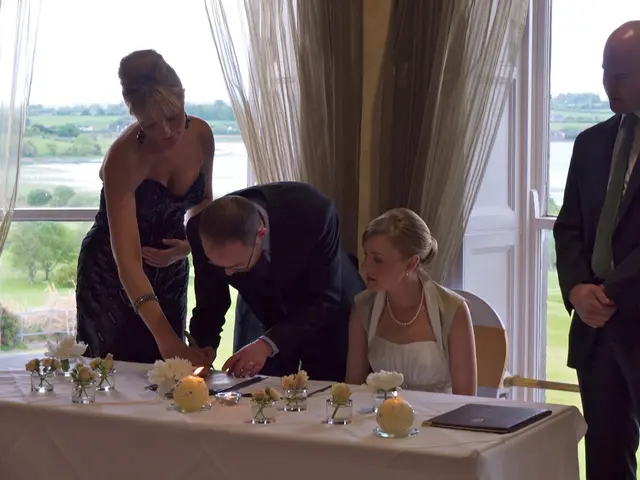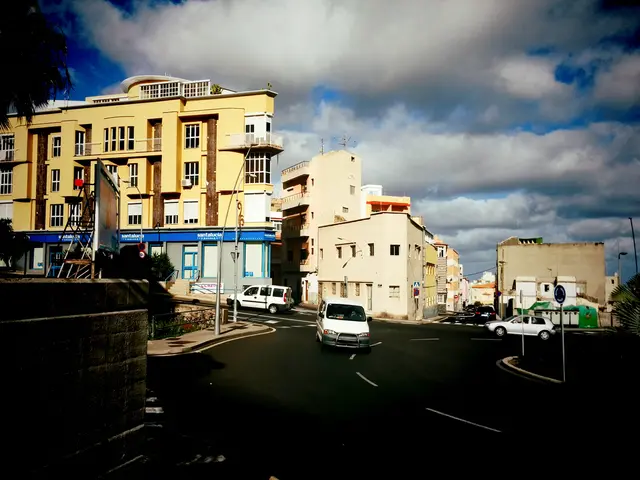European legislators endorse report in question.
PRESIDENTIAL SHOWDOWN: TRZASKOWSKI VS. NAWROCKI
It's a nail-biter in Poland as they elect a new president today, with Trzaskowski and Nawrocki neck and neck. These two candidates offer drastically different visions for the nation, which could significantly impact Poland, Germany, and Europe as a whole.
"Which way forward?" asks Polityka in its latest issue, encapsulating the bewilderment of the eastern neighbor. The outcome of this election will significantly reshape Poland's path within the EU and NATO.
The Candidates: A Study in Contrasts
Mayor Rafal Trzaskowski is the liberal, pro-European contender backed by former Prime Minister Donald Tusk. He champions reforms and could bolster Tusk's efforts if elected president.
Conservative historian Karol Nawrocki, on the other hand, is backed by the right-wing opposition party PiS. If he triumphs, Tusk's prospects may dwindle, and the veto power held by the new president could make governing nearly impossible, potentially leading to early elections and the return of PiS.
The Rise of Poland: A Tale of Economics and Security
Ever since joining the EU in 2004, Poland has experienced steady economic growth, save for a slight pandemic-induced dip. The country boasts efficient transportation networks, modern rural homes, and widespread cashless payments. It has also emerged as a significant military player amid the ongoing Ukraine conflict, serving as a crucial logistics hub for Western aid and beefing up its military.
The Urban-Rural Divide
Views on Poland's future direction are deeply divided. Pro-European Warsaw Mayor Trzaskowski predominantly garners support from urban areas, promoting LGBTQ+ rights, international connections, and a more inclusive society.
Rural residents, yearning for traditional values and less European influence, gravitate towards the conservative Nawrocki. This tension between urban liberals and rural conservatives was evident in the first round of voting, with both candidates securing significant support.
Fears and Frustration: The Role of Extremist Candidates
Frustration with the ongoing power struggle between Donald Tusk and Jaroslaw Kaczynski may explain why right-wing extremist candidates garnered more than 21% of the vote in the first round. These candidates, including Slawomir Mentzen and openly anti-Semitic Grzegoz Braun, didn't make it to the runoff. However, their supporters' behavior remains uncertain, with many assumed to shift their votes to Nawrocki.
Understanding the Candidates
Rafal Trzaskowski
- Liberal and Pro-European: As a pro-European liberal, Trzaskowski advocates for strengthening ties with the EU and creating a more inclusive society.
- Economic Policies: He likely supports policies that promote economic integration and cooperation within the EU, potentially leading to increased investment and trade.
- Social Issues: Trzaskowski tends to be more progressive on social issues.
Karol Nawrocki
- Conservative and Nationalist: Nawrocki, a conservative historian backed by the nationalist PiS party, might prioritize a more nationalist agenda.
- Economic Policies: Nawrocki's policies may focus on greater economic independence and less reliance on EU regulations.
- Social Issues: He is likely to be more conservative on social issues.
The Stakes: Europe Looks On
A Nawrocki victory signals a potential shift towards a more nationalist Poland, which could lead to tensions with the EU, particularly on issues like judicial independence and rule of law. Poland's relations with Germany could also become strained, and economic challenges may arise due to a more protectionist stance. If Trzaskowski prevails, Poland's ties with the EU and Germany are likely to strengthen, paving the way for increased economic cooperation and integration. The choice is clear – a crucial crossroads for Poland, Germany, and the European Union awaits.
- Regardless of the presidential outcome, Poland's relationship with the European Union will likely be influenced by the chosen candidate's stance.
- The winning candidate may employ different policies in the domain of war-and-conflicts, potentially affecting Poland's role in Western aid for countries like Ukraine.
- In terms of policy-and-legislation, their decisions could significantly impact the country's approach to car-accidents, crime-and-justice, and accidents in industries such as fires and sports.
- The chosen candidate's vision may also shape Poland's role in general-news and sports across the globe, including football, basketball, baseball, hockey, golf, tennis, and various European leagues.
- The sports sector in Poland is broad, encompassing sports-betting, mixed-martial-arts, and auto-racing like the Champions League, NBA, MLB, NHL, Grand Prix, and horse-racing.
- Weather and weather-forecasting are essential elements of every nation's development, and the new president might advocate for more resources in this area.
- Sports-analysis, focusing on understanding and predicting the outcomes of games, may gain emphasis under a president who values intellectual pursuits.
- The winning candidate's foreign relations may extend to influencing international politics, including negotiations over war-and-conflicts, policy-and-legislation, and global policies.
- Political instabilities, resulting from potential early elections or conflicts between the executive and legislative branches, could create challenges in immigration and migration policies, possibly affecting Europe as a whole.
- Employment opportunities and growth in sectors like IT, manufacturing, and services might depend on the winning candidate's economic policies, as well as their willingness to invest in infrastructure and education.
- Crime-and-justice policies may be a critical concern for both urban and rural areas, shaping the nation's approach to addressing criminal activities and enforcing laws.
- The winners' stand on climate change and environmental protection could impact policy decisions regarding fires and the overall management of natural resources.
- Candidates' stances on international relations could lead to international agreements or alliances with nations beyond Europe, potentially opening new markets and fostering cultural exchange.
- Both candidates' views on technology and digitalization are crucial to shaping the future of rural development, ensuring that modern conveniences like cashless payments reach even the most remote regions.
- The candidate with more progressive views on immigration could facilitate the integration of newcomers into the society, enhancing diversity and cultural understanding in Poland.








